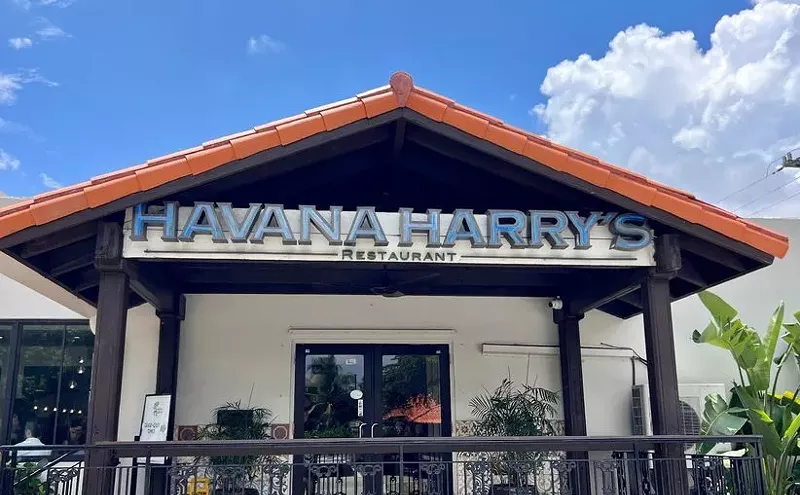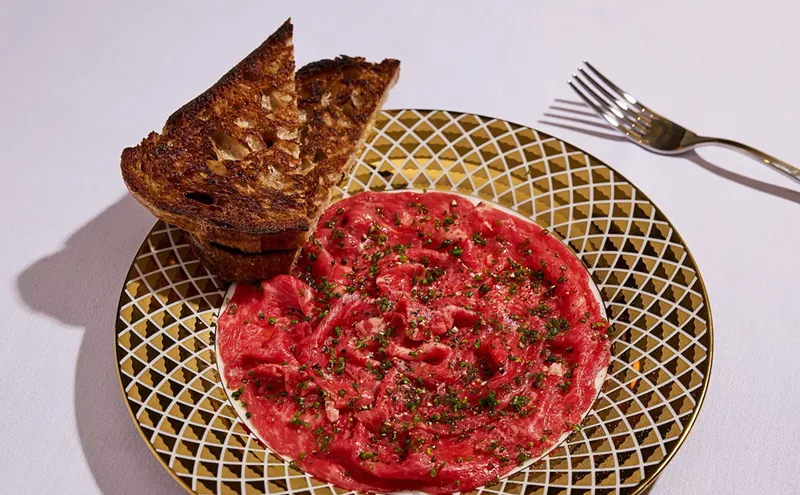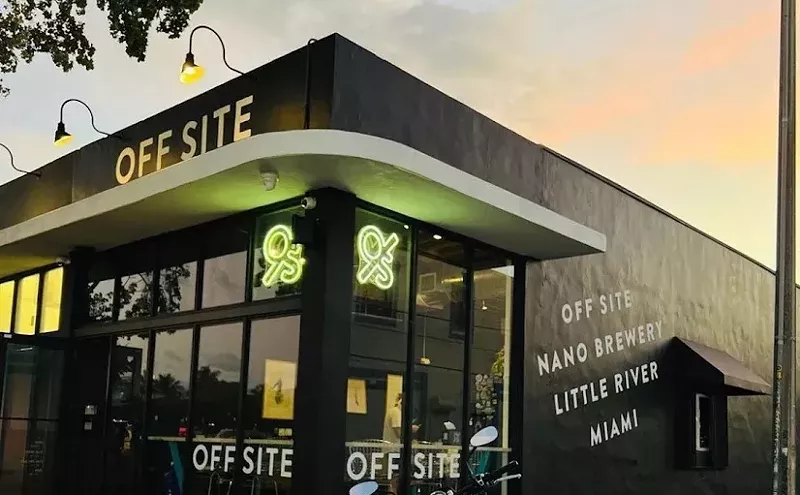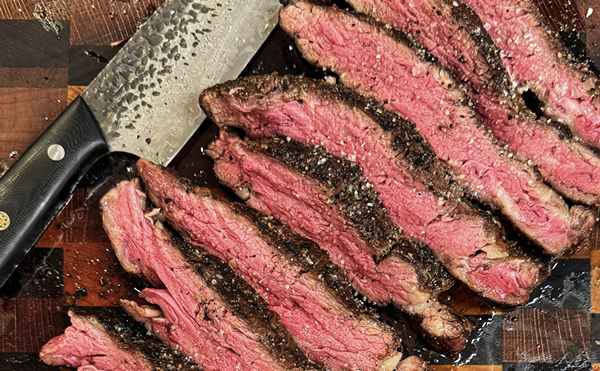There are few restaurant dishes I can stand to eat once weekly, but Blackbrick's mapo tofu ($16) has been a Sunday night staple at my household for over a year now (thank you Delivery Dudes). What impresses me most about this dish isn't that it converted my carnivorous husband into a tofu fan, but that the vegan version is just as delicious when it's offered in its original, meaty form.
Traditionally, mapo tofu consists of braised tofu with minced pork (occasionally beef) in a set-your-mouth-on-fire spicy sauce made with fermented black beans and fermented broad bean paste, along with hot red pepper and Sichuan pepper. The dish hails from China's Sichuan province, where chili oil is in abundant use.
Chef and owner of Midtown's Blackbrick, Richard Hales, says his mapo incorporates both the Sichuan-style of cooking (i.e. lots f chili oil) and the American style of building a sauce with many different layers to it. The multi-dimensional sauce, he explains, is the reason why the vegan variation is so good.
First, to make the actual chili oil, Hales burns a combination of sesame oil, black Szechuan peppercorns, sliced ginger and scallions in a wok and saves the burnt oil to use as a base. He then adds Sichuan peppercorns, red chilis, garlic and scallions to it. The tofu is immersed in that, as well as another sauce made of hoisin, sweet bean paste, sesame oil and soy. Finally, Hales adds chopped up marinated shiitake mushrooms to replace the heritage pork from Ocala, Florida. The chef himself sticks to a mainly plant-based diet and says this is how he likes to enjoy the dish, so you know no corners are being cut.
"I do vegan in a way that it doesn't matter that it's vegan," says Hales. "The vegan mapo doesn’t have the fattiness of the meat so that unctuous fatty taste isn’t there, but it's still really good. You can't really tell the difference."
Without the pork, the dish is a bit lighter, this is true, but the perfectly soft tofu curds are the same, and trust me —- it's no less hot. In fact, sometimes the mapo emerges extra spicy, which Hales explains simply means his cook from Hunan is on the wok. He says that while typically he'd correct such inconsistencies in the kitchen, he likes to let his veteran Chinese chefs exercise creative control so long as it's within a certain range and makes sense with the restaurant's more modern style.
Blackbrick's mapo tofu with pork is one of the eateries best-sellers, but it also happens to be the dish that helped shape the restaurant's identity. Hales says that when he was interviewing chefs prior to Blackbrick's opening nearly two years ago, he asked them to prepare a dish that their grandmothers would make and one of the candidates prepared mapo tofu.
"When I first tasted it I said, this is the direction of the restaurant. This particular dish is where we’re going to start everything from. And then I developed that dish with all of the technique behind it, burning the oil, etc. and that became the basis of a lot of other dishes. That chili oil goes into a lot of things."
When Hales moved to Miami from New York 13 years ago, he says he loved eating at Tropical Chinese down South. However, he later came to the realization that he wants to eat more modern reiterations of Chinese fare and to do so in a hip, relaxed setting. This makes his Midtown eatery a novelty of sorts, but also makes it hard to attract experienced Chinese cooks, some of whom can be firm in their ways, says Hales. That said, the half-Phillipino, half-American toque who trained at the French Culinary Institute and traveled throughout Asia asking chefs to let him work for free, says Blackbrick's kitchen and front of the house team is the best it's ever been and he's excited about the restaurant's future.
It will include more vegan dishes added to the menu's already pretty impressive meat-less section, as well as the intro of new fish options. Hales hasn't updated the menu in nearly eight months and says the time has come to make some tweaks. The challenge will be finding ample time to do so while tending to his newly opened Centro Taco in downtown Miami, and his other Midtown spot, the fast-casual, Sakaya Kitchen.
He says being a local restaurateur isn't easy, and agrees with a comment recently made by the Dutch's departed chef, Conor Hanlon, regarding how he wishes the fascination with out-of-town chefs would stop and there’d be more resources put towards the little guys. "I think it’s a valid point about the market that we really need to support the local guys. We can't just talk about local and go to Whole Foods and think that’s enough. There’s a whole business here and a whole infrastructure here that needs to be supported to keep the purveyors in business, the family farms in business and to keep us in business."
Follow Valeria Nekhim on Twitter and Instagram.

Audio By Carbonatix
[
{
"name": "GPT - Billboard - Slot Inline - Content - Labeled - No Desktop",
"component": "22004575",
"insertPoint": "2",
"requiredCountToDisplay": "2"
},{
"name": "STN Player - Float - Mobile Only ",
"component": "22595215",
"insertPoint": "2",
"requiredCountToDisplay": "2"
},{
"name": "Editor Picks",
"component": "17482312",
"insertPoint": "4",
"requiredCountToDisplay": "1"
},{
"name": "Inline Links",
"component": "18711090",
"insertPoint": "8th",
"startingPoint": 8,
"requiredCountToDisplay": "7",
"maxInsertions": 25
},{
"name": "GPT - 2x Rectangles Desktop, Tower on Mobile - Labeled",
"component": "23181625",
"insertPoint": "8th",
"startingPoint": 8,
"requiredCountToDisplay": "7",
"maxInsertions": 25
},{
"name": "Inline Links",
"component": "18711090",
"insertPoint": "8th",
"startingPoint": 12,
"requiredCountToDisplay": "11",
"maxInsertions": 25
},{
"name": "GPT - Leaderboard to Tower - Slot Auto-select - Labeled",
"component": "17720761",
"insertPoint": "8th",
"startingPoint": 12,
"requiredCountToDisplay": "11",
"maxInsertions": 25
}
]











